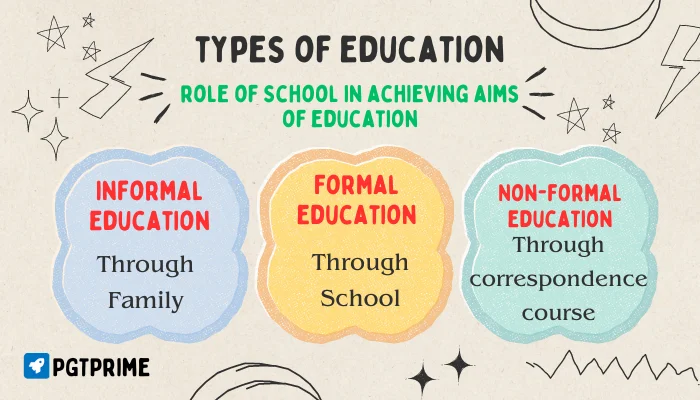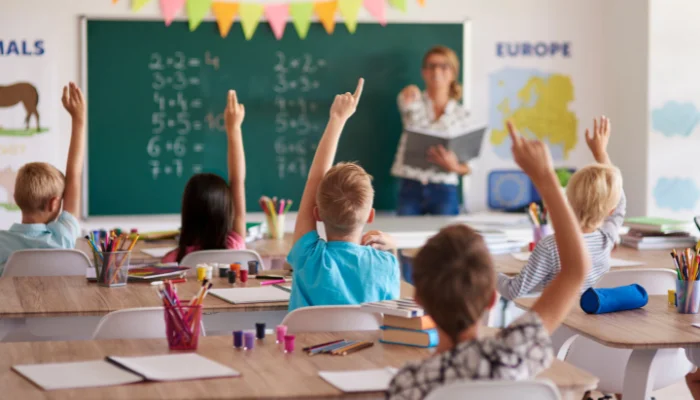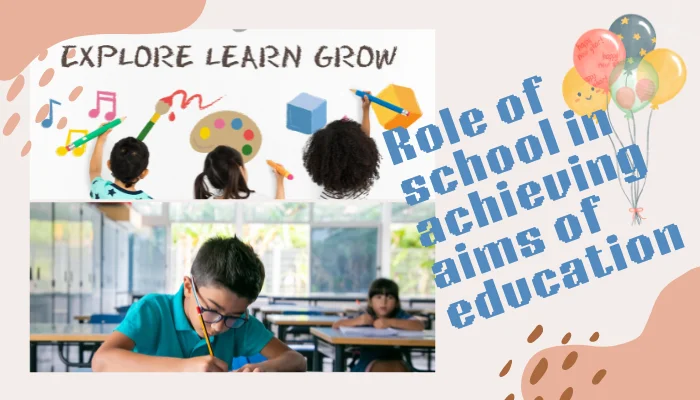The role of school in achieving aims of education encompasses beyond the school curriculum and covers a wide spectrum of student’s well-being. It aims to build a student structure that can withstand the test of time.
The school naturally nourishes students’ personality, health, and character by developing communication skills, problem-solving skills, teamwork, and critical thinking with a value of education like honesty, responsibility, respect, and kindness.
But, why do we give so much emphasis on the aim of education, and how aims of education influence schooling?
If we consider society as a set, then school definitely is a subset of this society. It is a place where children spend a considerable amount of time right from their childhood to their adolescence. They exchange tons of ideas, experiences, and thoughts which brings a different persona altogether.
These traits are essential for a progressive society where it act as a springboard for future happiness, the latest innovation, financial independence, and most important one, a healthy mindset.

As Dr. RadhaKrishnan emphasizes “Education in Indian tradition is not merely a means of earning a living; nor is it only a nursery of thought or a school for citizenship, it is an initiation into the life of spirit and training of human souls in the pursuit of truth and the practice of virtue“.
Briefly, we can say that a school plays a vital role in the holistic growth and development of a child, encompassing cognitive, emotional, social, and physical aspects.
Do you have any idea about the Unipolar, Bipolar, and Tripolar aspects of the role of school in achieving aims of education? Come, let’s discuss role of school in achieving aims of education in detail.
Role of School as an Agency of Education
The role of school in achieving aims of education plays a role as agencies of education, as a foundational pillar in the process of knowledge dissemination, skill development, and socialization.
Three Poles of Education:
- Unipolar: Child
- In a unipolar education system, a child is the center of attraction. Children are encouraged to learn independently. Montessori education is an example that emphasizes child-led learning.
- Bipolar: Child and Teacher
- This includes both the child and the teacher as central to the educational process. The teacher acts as a guide, facilitator, or mentor, where the child’s needs, interests, and experiences are prioritized.
- Tripolar: Child, Teacher, and Society
- Dewey’s most comprehensive model includes the child, the teacher, and the society. Education here is not confined to the classroom but is seen as a social process that prepares individuals to participate in society.
Types of Education:

| Informal Education | Formal Education | Non-Formal Education |
|---|---|---|
| Learning from outside the formal school system. | A well-defined curriculum, standardized methods of teaching, and formal assessment procedures. | Structured and intentional but does not conform to the standard curriculum, syllabus, accreditation, and certification associated with formal education. |
| e.g. Family. | e.g. School, Colleges, Universities. | e.g. Correspondence Course (IGNOU) |
The role of school in achieving aims of education weighs far more than an agency of education.
Role of School in Education

10 Essential Role of School in achieving aims of Education
- Academic Development.
- Personal Growth.
- Social Development.
- Emotional and Mental Health.
- Ethical and Moral Values.
- Physical Development.
- Lifelong Skills.
- Cultural and Artistic Growth.
- Civic and Social Responsibility.
Image by gpointstudio on Freepik Role of School in Achieving Aims of Education
What do we aim to achieve through the education provided by Schools?
- Holistic Development: Foster the overall growth and development of children, including cognitive, emotional, social, and physical aspects.
- Moral Distinction: Teach students to distinguish between fair and evil, unethical and ethical
- Truth and Innovation: Assist students in discovering the truth, challenging them to think in new and innovative ways.
- Responsible Citizenship: Develop children into responsible citizens who apply their learning and skills to help themselves and others.
- Meaningful Life: Recognize education as a social process that prepares individuals to lead a meaningful and dignified life, developing cognitive, affective, and connective capacities.
Role of School in a Child’s Life
Role of school in Achieving aims of Education provide all opportunities to every child. Various activities are organized in the school:
- Ensure child development and promote proper mental health of students.
- Increased functional literacy- 3 R’s. i.e. Reading, Writing, and Arithmetic.
- Connecting link between home and the outside world.
- Guidance and counseling services for students make them stronger and more efficient.
- Providing vocational education to students.
- A better place for learning for students can be achieved by implementing current policies such as the Nipun Bharat Mission, FLN in Education, ECCE, and NEP 2020.
Role of School in Growth and Development of a Child
Schools play a fundamental role in the growth and development of a child by providing an environment that nurtures intellectual, social, emotional, and physical well-being.
- Moral Development.
- Social Development.
- Cognitive Development.
- Cultural Development.
- Emotional Development.
- Physical Development.
- Preparation for Life.
Schools are not only places of academic pursuit but also vital arenas for socialization, creativity, and self-discovery. They offer a diverse range of experiences through extracurricular activities, peer interactions, all of which contribute to a child’s personal growth. Have a look!
Role of School in Moral Development
Schools are crucial in shaping moral development by creating an environment where ethical values are taught and practiced. Through rules, regulations, and a code of conduct, schools help students understand and embody honesty, respect, responsibility, and empathy.

Role of School in achieving aims of Education.
Achieving Educational Aims Role of School in achieving aims of Education.
By implementing rules and a code of conduct, schools promote citizenship and character building. The Article 60 code of conduct for students applies universally and includes guidelines such as:
- Morning assemblies with motivational speeches to highlight values like honesty, respect, and kindness.
- Development of discipline through the Attendance policy of the School.
- Bullying and physical violence are prohibited.
- Theft and property damage are punishable.
- Unauthorized materials are not allowed on school premises.
Role of School Management in Curriculum Development
School management plays a critical role in curriculum development. How? let’s understand school management’s contribution to curriculum development:
- School management strategizes to achieve the school’s vision and enhance learning.
- Defining Educational Objectives with alignment of Standards.
- Curriculum Design: Deciding on the subjects, topics, and materials to be included in the curriculum and Developing effective teaching methods and strategies.
- Resource Allocation: Ensuring that the necessary resources, such as qualified teachers, classroom materials, and technology, are available for effective curriculum implementation.
- They ensure the curriculum is in line with government policies and educational aims, providing a comprehensive education.
Effective school management is essential for creating an environment that supports academic excellence, student well-being, and overall institutional growth. By fulfilling these roles, school management can ensure the school operates smoothly and achieves its educational objectives.
Role of School in Socialization
Sharing is caring, Students share various things with their peers at school, including resources, knowledge, and feelings. The school environment helps them develop the ability to interact with and understand classmates from diverse backgrounds, thereby enhancing their social development.
Role of school in Environmental Education
By educating students, raising their awareness, and instilling a sense of environmental and social responsibility, schools play a vital role in conserving the environment through various student enrichment activities such as Swachhita Abhiyan, Eco Club, and Ek Bharat Shreshtha Bharat.

Role of School in Achieving aims of education
Role of School in Value Education
Schools play a pivotal role in value education concerning the nation by instilling a sense of patriotism, civic responsibility, and ethical conduct in students. Through the curriculum and extracurricular activities students are taught the importance of national identity, cultural heritage, and respect for the country’s symbols, and history. They can also engage students, parents, and the local community through various activities such as workshops, seminars, and campaigns.
Take a look at this table, which outlines initiatives to foster Environmental awareness and instill Values Education.
| Student Enrichment Activity | Skills and Values to be Enhanced |
|---|---|
| Eco-Club activities | Awareness about environmental conservation and protection clean lines habits. |
| Swachhta Abhiyan | Awareness about the benefits of cleanliness and developing cleanliness habits. |
| Ek Bharat Shrestha Bharat | A spirit of patriotism. |
| Rashtriya Ekta Diwas | Unity creative skills. |
| Debates and Discussions | Forums for students to discuss and debate environmental issues, encouraging value education. |
| Guest Lectures | Experts from specific fields speak to students, providing insights toward topics. |
Role of School in Promoting Creativity
Schools play a crucial role in fostering creativity by acting as a microcosm of society, reflecting its values and norms. Through curriculum and pedagogy, schools impart knowledge shaped by societal influences, while society influences what is taught and how it is delivered.

Role of School in Achieving aims of education
Student Enrichment Activities (Role of School in Achieving aims of education)
| Student Enrichment Activity | Skills and Values to be Enhanced |
|---|---|
| Storytelling competition, reading contest | Thinking skills, communication skills, and linguistic skills. |
| Arya Bhatt Giant Challenge | Reasoning abilities, problem-solving skills, critical thinking, and analytical thinking. |
| CBSE Heritage India quiz | Reasoning abilities, problem-solving skills, critical thinking analytical thinking, and ability to construct a logical argument. |
| Science exhibition and science literacy promotion test | Critical and creative thinking skills, scientific temperament, and connecting science to day-to-day life. |
| Expression Series | Creative thinking skills and communication skills. |
Role of School in Developing Humanistic Identity
Schools are crucial in developing a humanistic identity by promoting cultural heritage. Through diverse curricular and extracurricular activities, schools help students appreciate their own and others’ cultural backgrounds.

Role of school in achieving aims of Education
Role of School and Society in Creating a Barrier Free Environment
Schools
- Inclusive Education: Implementing policies and practices that ensure all students, regardless of their abilities or backgrounds, have equal access to education.
- Cultural Activities: Organizing events that celebrate diverse traditions and cultures to foster respect and appreciation among students.
Society
- Community Engagement: Encouraging community involvement in schools through volunteer programs and partnerships with local organizations.
- Awareness Campaigns: Conducting campaigns to raise awareness about the importance of diversity, inclusion, and accessibility.
Look at this table, which outlines initiatives to develop a humanistic identity and create a barrier-free environment for learning: Role of School in achieving aims of Education.
| Student Enrichment Activity | Skills and Values to be Enhanced |
|---|---|
| CBSE Heritage India quiz | Values of respect for diversity and tolerance, awareness about preserving India Heritage and monuments, & appreciation for the rich heritage and cultural diversity of the country. |
| Rashtriya Ekta Divas | Orientation to composite culture and diversity of our nation, the importance of its structure and implementations to citizens. |
| Matri Bhasha Divas | Awareness of linguistic and cultural traditions, values of tolerance and dialog, and socio-emotional skills. |
Future Challenges in the Role of School in Achieving Aims of Education
- Artificial intelligence is big news these days: will robots take over from teachers?
- Schools have not changed much physically.
- People are surprised by the thought of embracing technology to improve the learning environment.
- Virtual classes are becoming powerful nowadays because losing school days either through illness or bad weather will not hamper the learning process.
- Technology has made remote working simple just like Online makes learning easy.
Despite all the challenges and fear, there will always be a place for teachers. The reason I say this is that while intelligent machines can provide personalized experiences for students, human intervention is essential for correction, observation, discipline, and motivation. Teachers will always be necessary and irreplaceable.
Please let us know through the comment section if you want any topic to be discussed in this blog. We will try to provide an article on that subject as early as possible.
Please leave your valuable comment in the comment box! Your comments are valuable to us.












Please provide plan for activities based on different strategies and also content for science and mathematics pedagogy